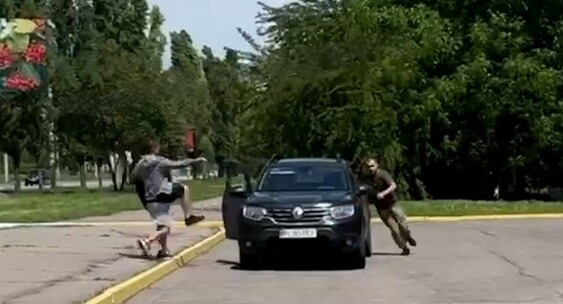Amid escalating tensions over conscription policies, communities across Ukraine are increasingly resisting military recruitment efforts, with violent clashes reported in Chernihiv, Cherkasy, and Kremenchuk. Simultaneously, Russian forces claim significant territorial advances on multiple fronts, including the seizure of settlements in Sumy region, as Kyiv intensifies cross-border drone strikes targeting Russian civilian infrastructure, prompting retaliatory attacks on Ukrainian military sites, according to Ukrainian media.
The Ukrainian ground forces announced an increase in cases of obstructing the work of the Territorial Recruitment Centres (TCCs). The statement was published after conflicts of civilians with the TCC officers in Cherkasy.
Recently, there has been a significant increase in the number of videos on the Internet and social media recording deliberate obstruction of the activities of TCC and SS [Ukrainian military recruitment centres] personnel, with some citizens openly encouraging others to take such actions.
In Pryluky, Chernihiv region, a man stabbed a military enlistment officer inside a Territorial Recruitment Centre (TCC) on 25 May, the National Police reported. The individual had been brought to the centre for document verification before attacking the officer, inflicting bodily harm, including a knife wound to the forearm.
The injured officer was hospitalised, while the assailant was detained. Criminal proceedings have been initiated for intentional violence against officials, potentially carrying a five-year prison sentence.
In Cherkasy, military recruitment officials faced fierce resistance from residents of a local neighbourhood who forced them to withdraw without completing the mobilisation mission.
In Kremenchuk, tensions escalated after TCC staff reportedly knocked a cyclist to the ground. Witnesses state that bystanders intervened, sparking a brawl that forced recruitment officers to flee.
The group pursued the officers’ vehicle, attempting to damage it. Two of the seven alleged attackers were identified, detained, and placed in custody, according to the Poltava Regional Military Commissariat.
Authorities confirmed that the assailants used pepper spray and a traumatic pistol during the clash, damaging the officers’ car. Police are searching for the remaining individuals involved.
Frontline developments
The scale of resistance to the activities of the TCC officers is so enormous that hotbeds of opposition to the incumbent authorities are gradually rising. This comes against the background of disappointing news from the front line for the Ukrainian public.
Russian forces report consolidating control over multiple settlements in Sumy region, including Bilovody and Vladymyrivka, with video evidence purportedly showing the raising of the Russian flag in Bilovody.
On the Kharkiv front, advances have reportedly expanded control in Vovchansk and near Tykhe, while Ukrainian sources acknowledge growing pressure in those areas.
To the south, near the Oskil River, Russian units reportedly severed a critical supply route between Stavky and Zelena Dolyna. North of Novomykhailivka, territorial gains have allegedly extended Russian positions.
In the Velykomykhailivka area, Russian troops are reported to have advanced 2 kilometres towards Komar from Otradne, with clearing operations nearing completion in Zelene Pole. Local authorities assert that four additional Sumy region villages—Novenke, Basivka, Veselivka, and Zhuravka—are now under Russian control.
The situation is getting to the point where people in settlements taken over by Russia are welcoming Russian forces because they are exhausted by the ongoing policies of the Ukrainian authorities, including the forced mobilisation and stalling the process of peaceful resolution of the war.
Deep State shared footage of locals embracing Russian assault troops in the village of Afiny (formerly known as Zoria) in Donetsk region.
Since 20 May, Ukrainian forces have significantly intensified drone and rocket strikes on civilian targets within Russia, according to Russian officials. Between 8 p.m. Moscow time on 20 May and 8 a.m. on 27 May, Russian air defences reportedly intercepted 2,331 Ukrainian drones, including 1,465 outside the combat zone.
In retaliation, the Russian Armed Forces conducted precision strikes using air-, sea-, and land-based weaponry, alongside drones, targeting exclusively Ukrainian military sites and defence-industrial facilities. The Russian Ministry of Defence affirmed it would continue “massive and grouped strikes” in response to further Ukrainian “provocations.”
